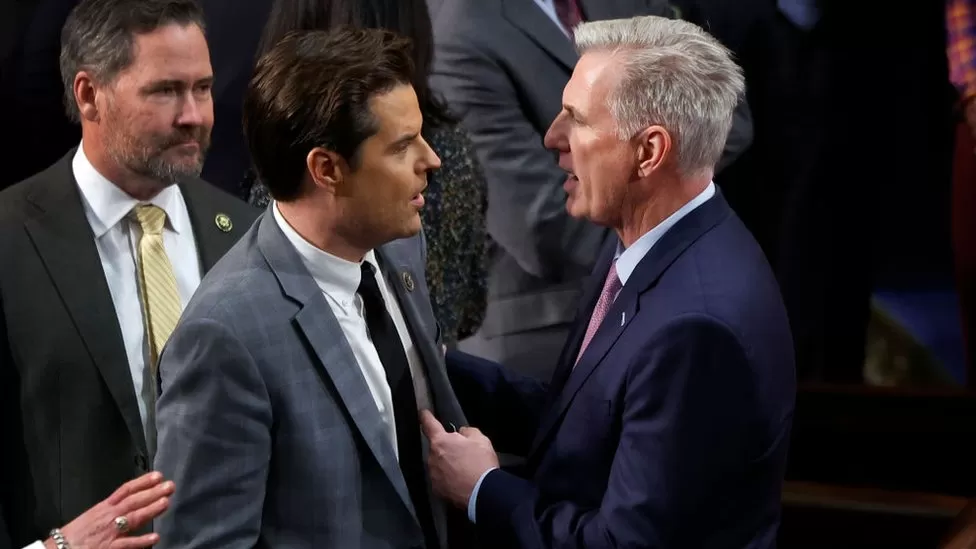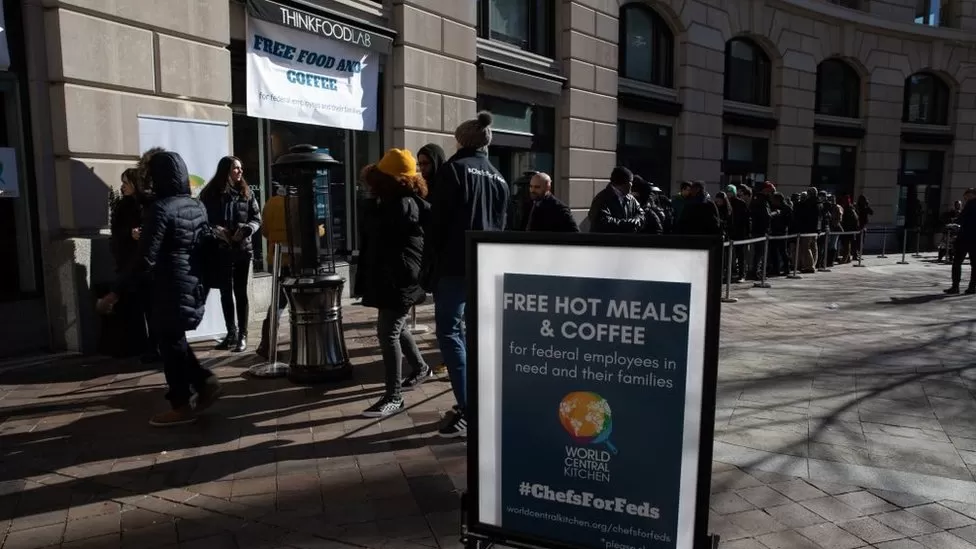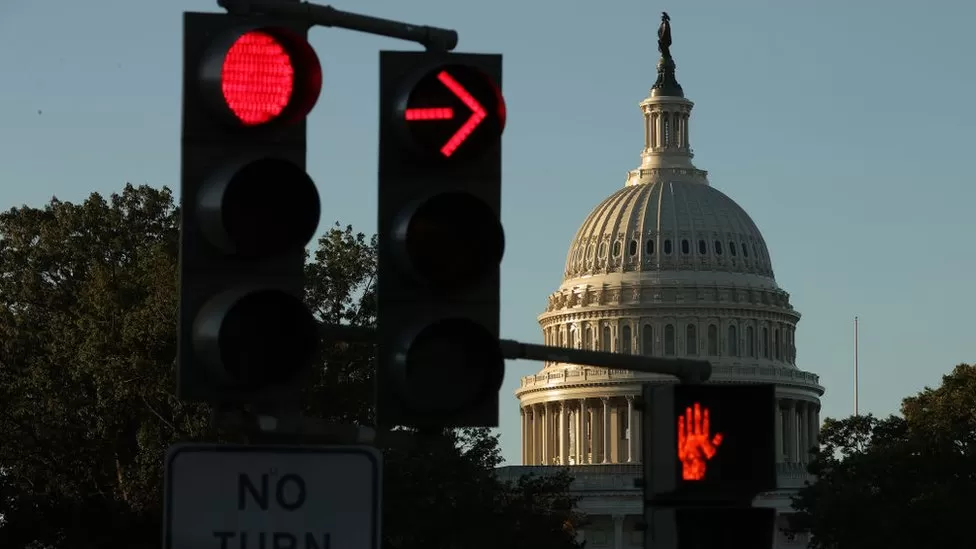The U.S. government stands at the precipice of another shutdown as Congress seems set to overshoot the funding deadline for federal agencies set for Saturday at midnight.
This potential shutdown, the fourth in the last ten years, could have broad ramifications, touching sectors from aviation to national parks and the issuance of marriage certificates.
A large portion of government staff will face unpaid leaves, and vital nutrition initiatives will come to a standstill.
This situation has arisen following a staunch conservative uprising in the US House of Representatives.
While Republicans have a narrow majority in the House, Democrats have a one-seat edge in the Senate.
This configuration means that to keep the government operational, spending bills need bipartisan support to move through both legislative bodies and reach President Joe Biden for approval.
However, a group of conservative legislators has stalled House discussions, demanding significant expenditure reductions, including a halt to U.S. financial support for the conflict in Ukraine.
Receiving vocal online endorsement from ex-President Donald Trump, these staunch conservatives have thwarted Speaker Kevin McCarthy’s attempts to guide the necessary legislation through the House.
Though McCarthy could theoretically seek Democratic votes to pass a spending proposal, such a move might provoke the conservative group to challenge his leadership position.
Furthermore, McCarthy has declined to consider a short-term funding proposal currently under Senate review. This bill, allocating $6bn each for Ukraine and disaster relief, represents a final attempt to prevent an extended shutdown and seems to enjoy broad support in the Senate.
On Friday, the House Republicans’ interim funding proposal, which incorporated stringent border measures favored by the conservatives, was turned down by 21 party members and did not pass.
In a private session, McCarthy indicated that Republicans would need to choose between the House or Senate’s bill to avoid being held responsible for the shutdown.
However, the conservative group remained firm, insisting on a long-term spending bill that addresses their concerns.
South Carolina Congresswoman Nancy Mace, a moderate who voted against the House bill on Friday, stated on X, “This ultimatum of ‘accept this or face blame’ won’t sway us.”
She added, “I’m committed for the long haul and am ready to challenge the Washington establishment to achieve it.”

Republican Congressman Matt Gaetz (centre) has publicly threatened to oust Kevin McCarthy (right) as Speaker
Senate Majority Leader, Chuck Schumer, criticized Mr. McCarthy for introducing a “highly unconventional” proposal that wouldn’t pass in both chambers.
“He should stop trying to satisfy the far-right elements within the [Republican] party,” Schumer remarked.
The White House echoed Schumer’s sentiments, urging the House to support his funding bill.
“The Senate has provided a bipartisan roadmap to ensure the government remains funded. It’s time for House Republicans to follow suit,” stated press secretary Karine Jean-Pierre on Friday.
Treasury Secretary Janet Yellen expressed her concerns, stating, “The reluctance of House Republicans to act sensibly could negatively impact American households and create economic challenges, potentially hindering the progress we’ve achieved.”
Yellen further highlighted that essential services, such as loans for farmers and small enterprises, food and workplace safety checks, and significant infrastructure upgrades, would be compromised.
Shutdowns occur when Congress fails to sanction approximately 30% of the federal budget required before the onset of each fiscal year on October 1.
This implies that by Monday, a vast number of federal employees, barring those considered “essential,” will be on unpaid leave. Many of these workers rely heavily on their monthly salaries, as noted by the American Federation of Government Employees.
Over 1.4 million active-duty military personnel and numerous air traffic controllers will continue to work, albeit without compensation.
This situation poses a significant concern for federal employees with student loans. Loan repayments for over 40 million individuals are set to resume on Sunday, having been suspended since the pandemic’s inception.
On Friday, the House Republicans’ interim funding proposal, which incorporated stringent border measures favored by the conservatives, was turned down by 21 party members and did not pass.
In a private session, McCarthy indicated that Republicans would need to choose between the House or Senate’s bill to avoid being held responsible for the shutdown.
However, the conservative group remained firm, insisting on a long-term spending bill that addresses their concerns.
South Carolina Congresswoman Nancy Mace, a moderate who voted against the House bill on Friday, stated on X, “This ultimatum of ‘accept this or face blame’ won’t sway us.”
She added, “I’m committed for the long haul and am ready to challenge the Washington establishment to achieve it.”

Federal workers stood in lines for food during the 2018-19 government shutdown, which lasted 34 days
The impending shutdown will directly affect the Special Supplemental Nutrition Program for Women, Infants, and Children (WIC), which offers grocery support to seven million expectant mothers and recent mothers.
If the shutdown extends, the Supplemental Nutrition Assistance Program (SNAP), commonly referred to as “food stamps” and catering to 40 million underprivileged Americans, might be impacted. This could also delay the rollout of a new initiative aimed at providing free breakfast and lunch to students in schools with high needs.
Federal government-backed or funded entities like museums, national parks, research institutions, and community health centers are expected to halt operations during the shutdown.
Moreover, the primary government body responsible for disaster relief and recovery is currently strategizing to preserve funds, especially if the shutdown coincides with an unusually active Atlantic hurricane season.
Such budgetary conflicts, leading to disruptions, are unique to the US and have been criticized as a reflection of Washington’s increasing inefficiency and deepening partisan rifts.
The previous government shutdown in 2019, during Mr. Trump’s tenure, spanned a record 34 days.
This resulted in a loss of $11 billion in economic activity, as per the Congressional Budget Office, and saw federal employees queuing up at food banks.

